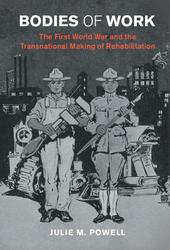
|
Bodies of Work: The First World War and the Transnational Making of Rehabilitation
Hardback
Main Details
| Title |
Bodies of Work: The First World War and the Transnational Making of Rehabilitation
|
| Authors and Contributors |
By (author) Julie M. Powell
|
| Series | Studies in the Social and Cultural History of Modern Warfare |
|---|
| Physical Properties |
| Format:Hardback | | Pages:280 | | Dimensions(mm): Height 235,Width 160 |
|
| Category/Genre | Military history |
|---|
| ISBN/Barcode |
9781009230285
|
| Classifications | Dewey:362.408697 |
|---|
| Audience | |
|---|
| Illustrations |
Worked examples or Exercises
|
|
Publishing Details |
| Publisher |
Cambridge University Press
|
| Imprint |
Cambridge University Press
|
| Publication Date |
27 October 2022 |
| Publication Country |
United Kingdom
|
Description
Bodies of Work examines the transnational development of large-scale national systems, international organizations, technologies, and cultural material aimed at rehabilitating Allied ex-servicemen, disabled in the First World War. When nations mobilised in August 1914, it was thought that casualties would be minimal and the war would be quickly over. Little consideration was given to what ought to be done for those men whose bodies would forever bear the marks of war's destruction. Julie M. Powell charts how rehabilitation emerged as the best means to deal with millions of disabled ex-servicemen. She considers the ways in which rehabilitation was shaped by both durable and discrete influences, including social reformism, paternalist philanthropy, the movement for workers' rights, patriotism, class tensions, cultural ideas about manliness and disability, nationalism, and internationalism. Powell sheds light on the ways in which rehabilitation systems became sites for the contestation and maintenance of boundaries of belonging.
Author Biography
Julie M. Powell is an IRC post-doctoral fellow at University College Dublin.
Reviews'Julie Powell's transnational history of the wounds of wars is one of struggle and hope. She explores the ways war-wounded servicemen as well as their families, communities, and governments attempted to reintegrate disabled men back into civilian society. While acutely sensitive to national variations, Powell has powerful things to say not only about the bodily and emotional horrors of war, but also about the right to rehabilitation and the politics of sympathy.' Joanna Bourke, Birkbeck University of London 'Powell's book makes a vital contribution to the social history of medicine and the First World War. Taking a truly transnational approach to the history of rehabilitation, she tells a story not only of medicine and the male body, but also international cooperation, workers' rights and humanitarian aid in wartime.' Jessica Meyer, University of Leeds 'Bodies of Work is a landmark contribution to scholarship on World War I and the Allied war disabled. Powell's international scope of research is impressive, her prose engaging and insightful, and her arguments convincing and important. This book deserves the attention of all who are researching the war, its precedents, and its aftermath.' Jeffrey S. Reznick, author of John Galsworthy and Disabled Soldiers of the Great War
|